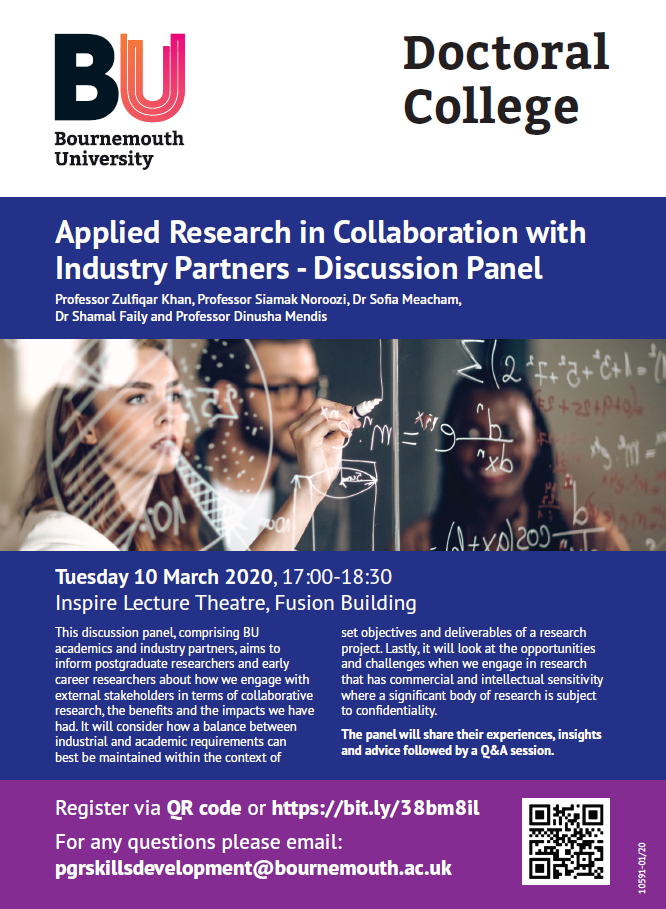
Applied Research in Collaboration with Industry Partners – Discussion Panel

Latest research and knowledge exchange news at Bournemouth University

![]() Congratulations to Dr. Pramod Regmi, lecturer in International Health, whose article ‘Hazards of Beauty’ featured in Republica, a national daily newspaper published in English in Nepal. Many transgender people who are using hormones are mostly attracted by its short-term benefit of amplification in their feminine look and seem to be ignorant about its dark side. This newspaper article highlights the key issues of a recent paper in BMJ Open published by staff in the Faculty of Health & Social Sciences on transgender in Nepal [1].
Congratulations to Dr. Pramod Regmi, lecturer in International Health, whose article ‘Hazards of Beauty’ featured in Republica, a national daily newspaper published in English in Nepal. Many transgender people who are using hormones are mostly attracted by its short-term benefit of amplification in their feminine look and seem to be ignorant about its dark side. This newspaper article highlights the key issues of a recent paper in BMJ Open published by staff in the Faculty of Health & Social Sciences on transgender in Nepal [1].
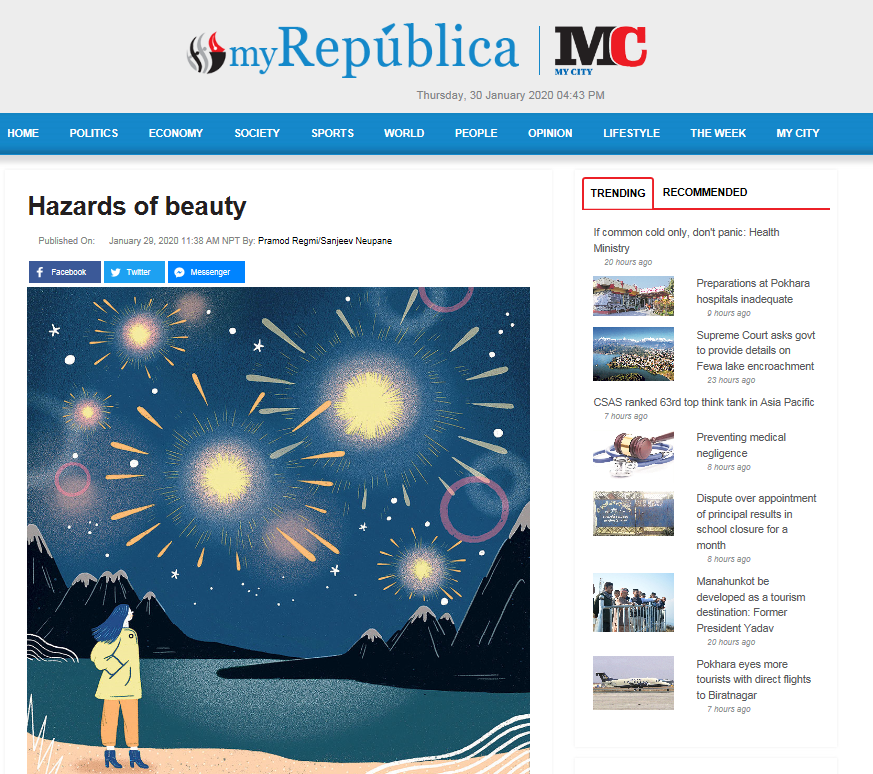
Reference:
Two new links have been added to the Clinical Governance blog under the ‘Useful Links and Documents’ section which give further information and guidance as to attending an NHS Research Ethics Committee meeting for your project. The links are also provided below-
Remember – support and guidance is on offer at BU if you are thinking of conducting clinical research, whether in the NHS, private healthcare or social care – get in touch with Research Ethics. You can also take a look at the Clinical Governance blog for resources and updates.
You are invited to attend the first BU Public Engagement Network meeting, in FG04 from 1:30-2:30pm Tuesday 28 January. Please email publicengagement@bournemouth.ac.uk to be invited to the meeting, so we have an idea of numbers for catering.
This initial meeting will establish the network, which aims to provide opportunities for sharing experience and expertise, as well as networking opportunities for staff interested in public engagement with research.
The network will be for BU staff, though we hope to welcome external speakers in future.
Agenda
At this first meeting, we will hear from Dr Emma Kavanagh and Dr Adi Adams from the Sport department about their creative methods for public engagement; turning research into an exhibition at last year’s ESRC Festival of Social Science.
We’ll also introduce the public engagement team and explain the support available to you for public engagement and impact.
This will also be your opportunity to help define the direction of the network. We’ll discuss how to make the network work best for you, in terms of content and meeting arrangements, as well as what you want from a regular newsletter.
Please come along, network with colleagues, meet the public engagement team and enjoy drinks and snacks.
Contact publicengagement@bournemouth.ac.uk with any questions.
We are re-running our public engagement training sessions this Spring, with ‘Getting started with public engagement with research‘ on 11 March, ‘High quality public engagement‘ on 29 April and ‘Evaluation: developing your approach‘ on 13 May.
We would like to invite you to the next research seminar for the Centre for Games and Music Technology Research.
Title: Learning to Observe: Approximating Human Perceptual Thresholds for Detection of Suprathreshold Image Transformations
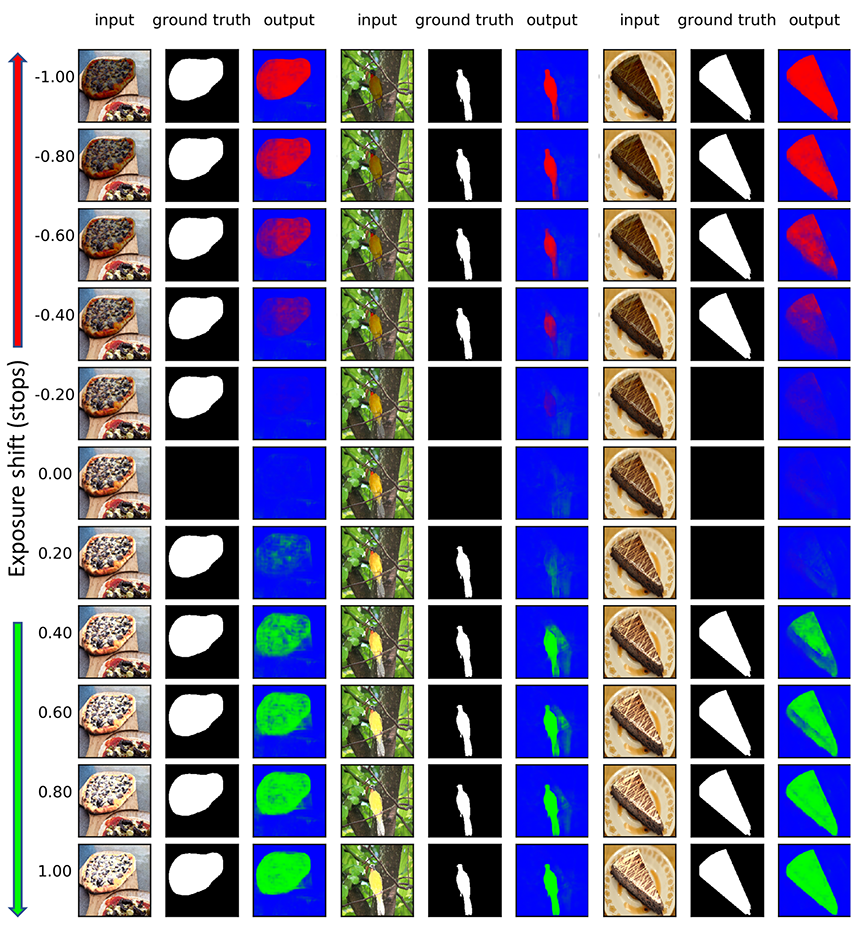
Speaker: Dr Carlo Harvey (Birmingham City University)
Time: 2:00PM-3:00PM
Date: Wednesday 29 January 2020
Room: F310 (Fusion Building)
Abstract: Many tasks in computer vision are often calibrated and evaluated relative to human perception.
This talk presents a technique to directly approximate the perceptual function performed by human observers completing a visual detection task. Specifically, we present a novel methodology for learning to detect image transformations visible to human observers through approximating perceptual thresholds. To do this, we carry out a subjective two-alternative forced choice study to estimate perceptual thresholds of human observers detecting local exposure shifts in images. We then leverage transformation equivariant representation learning to overcome issues of limited perceptual data. This representation is then used to train a dense convolutional classifier capable of detecting local suprathreshold exposure shifts – a distortion common to image composites. In this context, our model is able to approximate perceptual thresholds with an average error of 0.1148 exposure stops between empirical and predicted thresholds. It can also be trained to detect a range of different pixel-wise transformation.
We hope to see you there!
Two local organisations are currently looking to host talks from academics who can talk about their research to a public audience.
Blandford Library and Sunrise Senior Living are both looking to arrange talks for the year ahead, expecting audiences of roughly 20-30 people each. At Blandford Library, this is likely to be a variety of people from the local community, at Sunrise this will be residents mostly from assisted living facilities.
If you think that this opportunity would be effective public engagement for your project, and would like to know more, please contact Adam Morris at publicengagement@bournemouth.ac.uk

Café Scientifique takes place on the first Tuesday evening of the month at Café Boscanova
Enjoy listening to a short talk from our guest speaker before engaging in debate and discussion around that topic.
We’ll be joined by Dr Sharon Docherty on Tuesday 4 February 7:30-9pm (doors open at 6:30pm) No need to book, make sure you get there early though as seats fill up fast!
Crooked picture frames and ageing of perception
How we experience the environment around us involves the brain combining information from our different sensory systems. Something as ‘simple’ as staying upright involves signals from our inner ears, joints and eyes. Join us to discover how our perception of upright changes throughout our lifetime, and how different medical conditions can affect this. It may also make you reconsider whether your picture frames are straight.
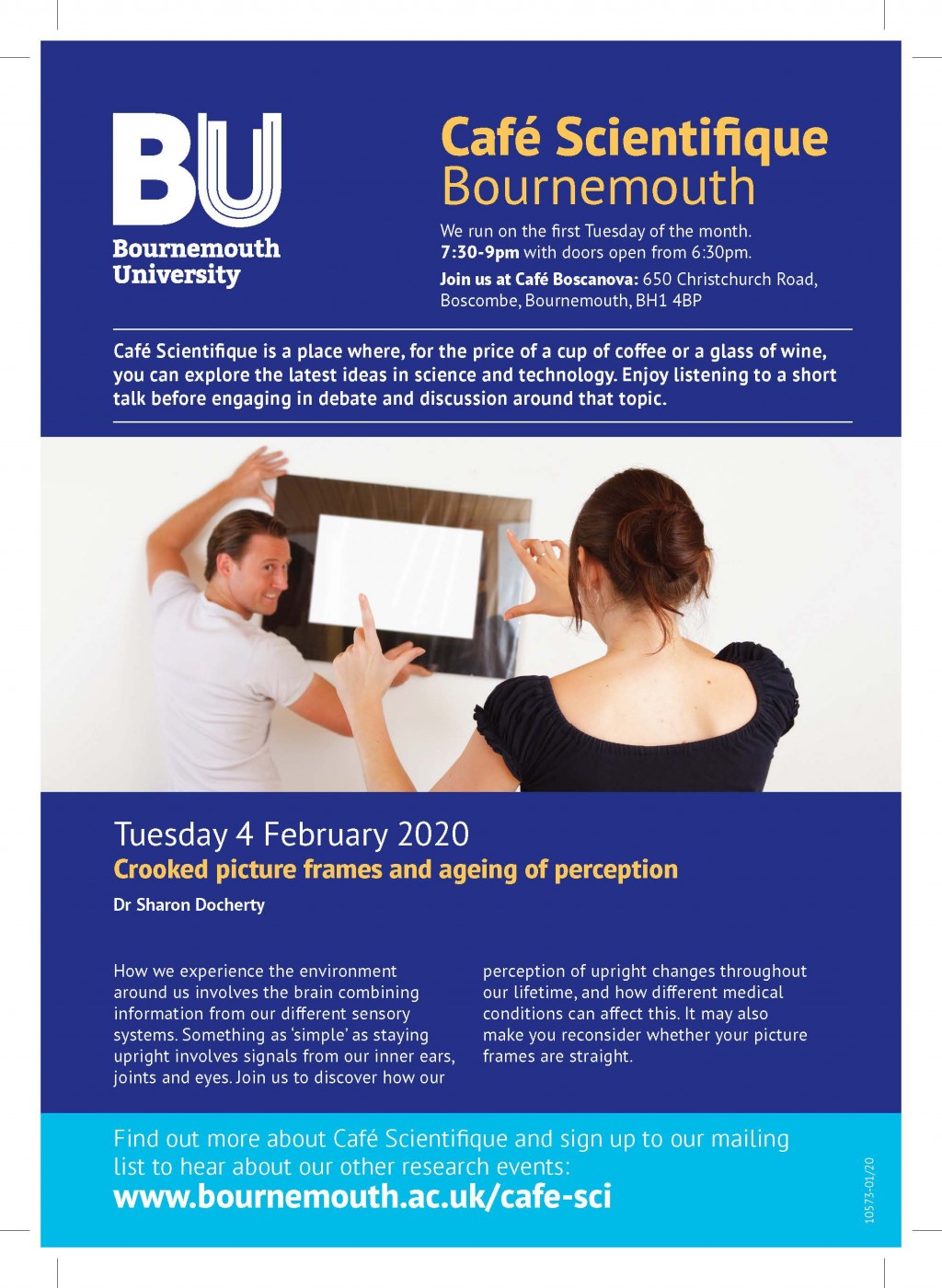 If you have any questions please do get in touch
If you have any questions please do get in touch
Find out more about Café Scientifique and sign up to our mailing list to hear about other research events: www.bournemouth.ac.uk/cafe-sci
Two resources are now available on the NIHR Learn website for researchers –
To access the above resources you will need to have access to the NIHR Learn website. Once you have an account select the tab ‘Health Research Innovations’ and then click on ‘NIHR Endorsed Learning’. Both courses are free and do not require an enrolment key.
Remember – support and guidance is on offer at BU if you are thinking of conducting clinical research, whether in the NHS, private healthcare or social care – get in touch with Research Ethics. You can also take a look at the Clinical Governance blog for resources and updates.
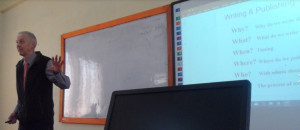 Last week FHSS’s Prof. Edwin van Teijlingen held a workshop on ‘academic publishing and writing’ with BU Visiting Professor Padam Simkhada. This event took place at Tribhuvan University, Nepal’s oldest and largest university. The capacity building workshop was organised by HEAN and the Health and Population Education Department at the Central Department of Education at Tribhuvan University. The local charity Green Tara Nepal acted as a facilitator. Bournemouth University has been collaborating with Green Tara Nepal for over a decade!
Last week FHSS’s Prof. Edwin van Teijlingen held a workshop on ‘academic publishing and writing’ with BU Visiting Professor Padam Simkhada. This event took place at Tribhuvan University, Nepal’s oldest and largest university. The capacity building workshop was organised by HEAN and the Health and Population Education Department at the Central Department of Education at Tribhuvan University. The local charity Green Tara Nepal acted as a facilitator. Bournemouth University has been collaborating with Green Tara Nepal for over a decade!
 This capacity building workshop is part of Bournemouth University’s GCRF-funded project called “Sheetal Asthitva” covering India and Nepal. Sheetal Asthitva is the brain child of Dr. Shanti Shanker in the Department of Psychology.
This capacity building workshop is part of Bournemouth University’s GCRF-funded project called “Sheetal Asthitva” covering India and Nepal. Sheetal Asthitva is the brain child of Dr. Shanti Shanker in the Department of Psychology.
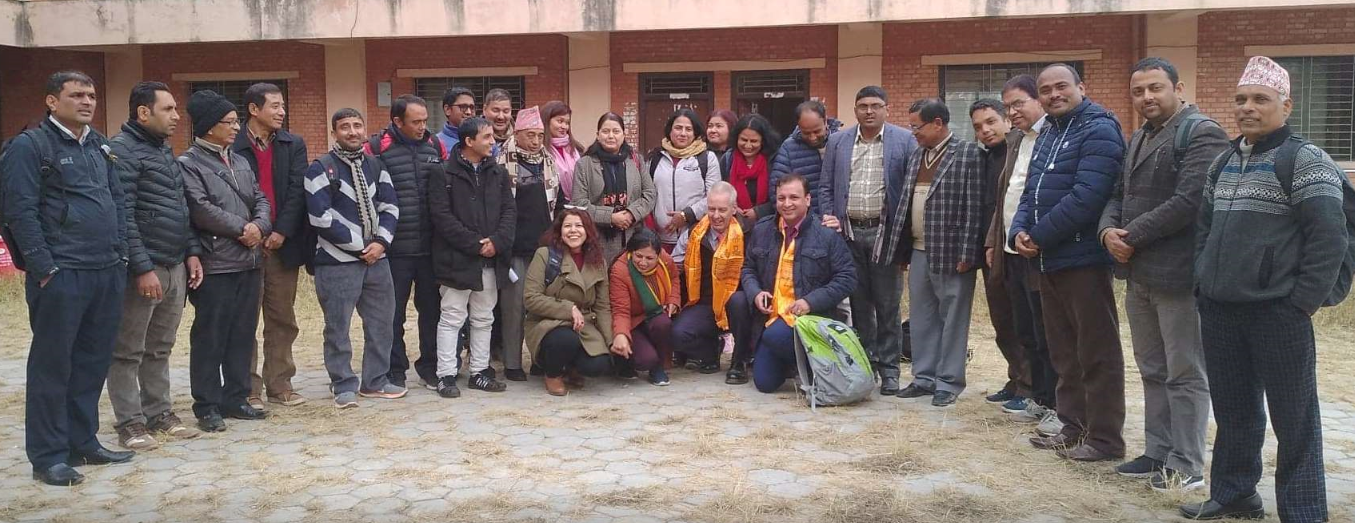

This week Research England launched a consultation on the draft REF 2021 Code of Practice Complaints and Investigation process.
A summary document of the process being consulted on is accessible here, full documentation is available here.
If you would like to offer any feedback for potential inclusion in BU’s response. Please email ref@bournemouth.ac.uk by noon 21st January 2020.
An exciting opportunity to attend a workshop, please see below for further details –
‘A team from the National Institute for Health Research (NIHR) are working on a project looking at how we recruit research study participants from commercial High Street health care providers (e.g. Boots, SpecSavers etc), or organisations that support health in some way (e.g. gyms, slimming clubs etc).
The project is titled Community-Based Research and we are looking to answer two specific questions:
These two groups could miss out on research opportunities currently because they don’t come into the standard health system until they are either considered to be too severe for High Street treatment (in the case of group 1) or they already have a health problem (in the case of group 2). We are looking to develop a process by which we can actively recruit participants at scale for trials before they need to access the health service, thus enabling better recruitment of milder disease and pre-disease phenotypes. We are aware that research is happening in these two groups and would like to pull together researchers who have this experience in order to learn from their successes and challenges.
To support this ETI we are running a workshop on January 31st, 10.30-3.30, at The Wesley Euston Hotel & Conference Venue, London, which will bring together the research community to discuss:
a) Examples of how we currently recruit from these settings, identifying successes and challenges
b) Based on these, identifying the key elements of a recruitment strategy that the Clinical Research Network could use
We would like to invite researchers to attend if this would be of interest. Please could nominated representatives complete this Eventbrite registration page (https://www.eventbrite.co.uk/e/nihr-crn-community-based-research-event-tickets-83954384825) including indicating which Specialty they are representing.’
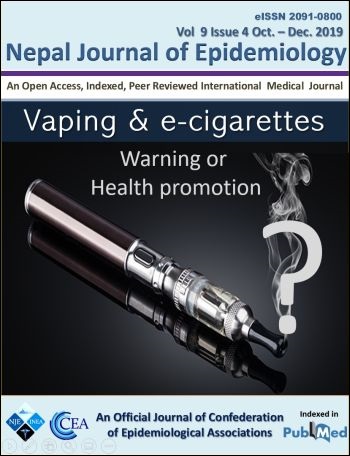 The Nepal Journal of Epidemiology published its final edition of 2019 today, on the final day of the year. This issue included an editorial co-authored by BU academics and BU Visiting Faculty. The editorial ‘Vaping and e-cigarettes: A public health warning or a health promotion tool?’ [1] addresses the topical public health question of what to make of vaping. On the one hand, vaping is generally regarded as less harmful than smoking tobacco, but on the other hand, it can be a gateway drug to cigarettes and the process of vaping a range of chemicals it in itself not harmless.
The Nepal Journal of Epidemiology published its final edition of 2019 today, on the final day of the year. This issue included an editorial co-authored by BU academics and BU Visiting Faculty. The editorial ‘Vaping and e-cigarettes: A public health warning or a health promotion tool?’ [1] addresses the topical public health question of what to make of vaping. On the one hand, vaping is generally regarded as less harmful than smoking tobacco, but on the other hand, it can be a gateway drug to cigarettes and the process of vaping a range of chemicals it in itself not harmless.
The paper has been written by two academics based in CMMPH (Centre for Midwifery, Maternal & Perinatal Health), Dr. Preeti Mahato and Prof. Edwin van Teijlingen and FHSS Visiting Faulty members Prof. Padam Simkhada (based at the University of Huddersfield) and Dr. Brijesh Sathian (based at Trauma Surgery,in Hamad General Hospital, Doha, Qatar) in collaboration with e-cigarette user Mr. Cameron van Teijlingen (based in Dorset) and Dr. Mohammad Asim (based at Trauma Surgery,in Hamad General Hospital, Doha, Qatar). The Nepal Journal of Epidemiology is Open Access and therefore freely accessible across the globe.
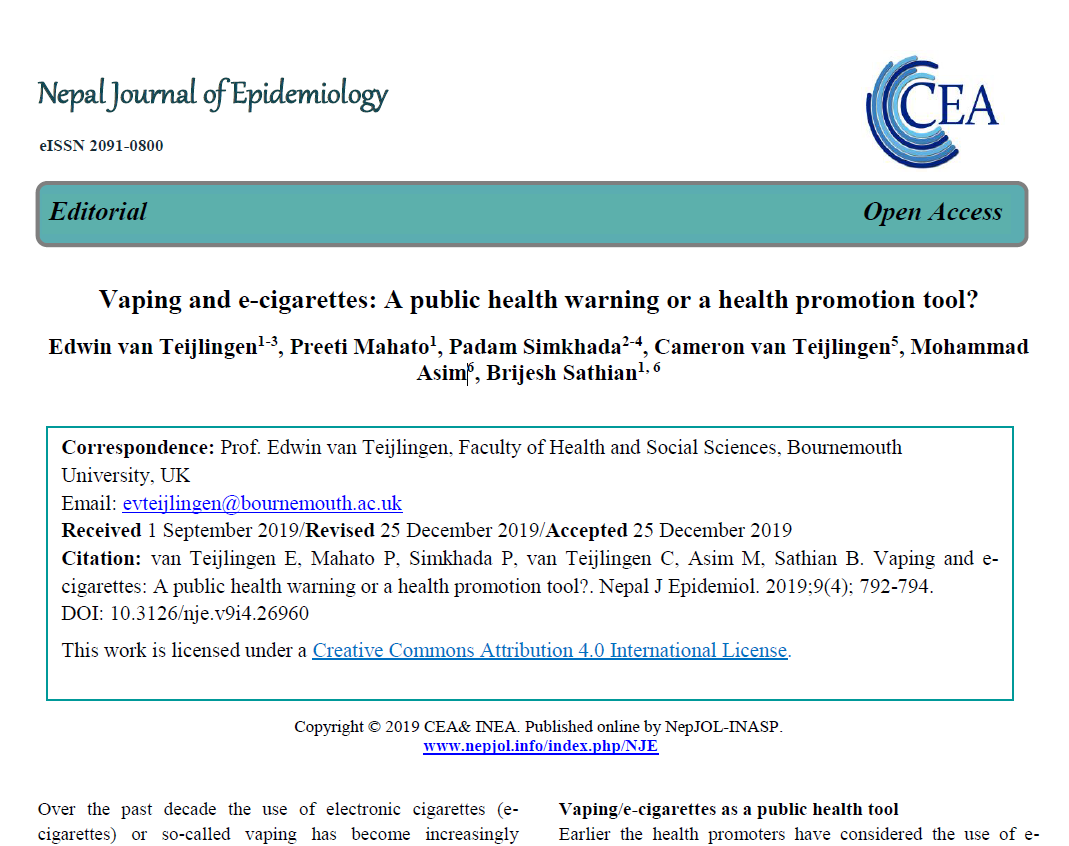
Reference:
And just in time for Christmas!
An exciting opportunity to attend a workshop, please see below for further details –
‘A team from the National Institute for Health Research (NIHR) are working on a project looking at how we recruit research study participants from commercial High Street health care providers (e.g. Boots, SpecSavers etc), or organisations that support health in some way (e.g. gyms, slimming clubs etc).
The project is titled Community-Based Research and we are looking to answer two specific questions:
These two groups could miss out on research opportunities currently because they don’t come into the standard health system until they are either considered to be too severe for High Street treatment (in the case of group 1) or they already have a health problem (in the case of group 2). We are looking to develop a process by which we can actively recruit participants at scale for trials before they need to access the health service, thus enabling better recruitment of milder disease and pre-disease phenotypes. We are aware that research is happening in these two groups and would like to pull together researchers who have this experience in order to learn from their successes and challenges.
To support this ETI we are running a workshop on January 31st, 10.30-3.30, at The Wesley Euston Hotel & Conference Venue, London, which will bring together the research community to discuss:
a) Examples of how we currently recruit from these settings, identifying successes and challenges
b) Based on these, identifying the key elements of a recruitment strategy that the Clinical Research Network could use
We would like to invite researchers to attend if this would be of interest. Please could nominated representatives complete this Eventbrite registration page (https://www.eventbrite.co.uk/e/nihr-crn-community-based-research-event-tickets-83954384825) including indicating which Specialty they are representing.’
Wednesday 4 December played host to The 11th Annual Postgraduate Research Conference which took place in the Fusion Building. To view highlights of the day visit #BUPGRConf19 on twitter.
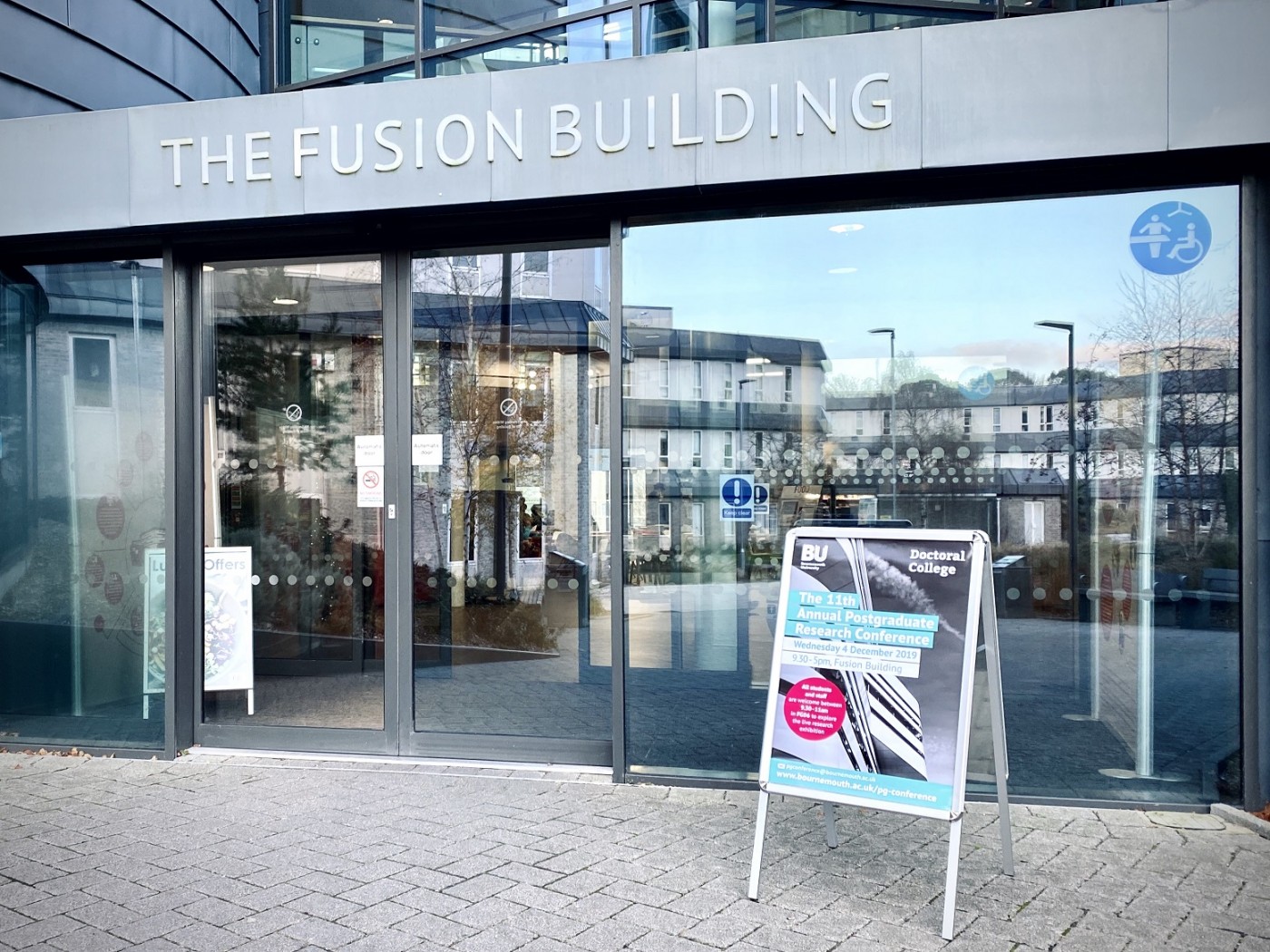
The day commenced with the live research exhibition where delegates had the opportunity to learn and practice infant CPR using a modified infant manikin and received novel real-time feedback via a monitor being used as part of Debora Almeida’s PhD.
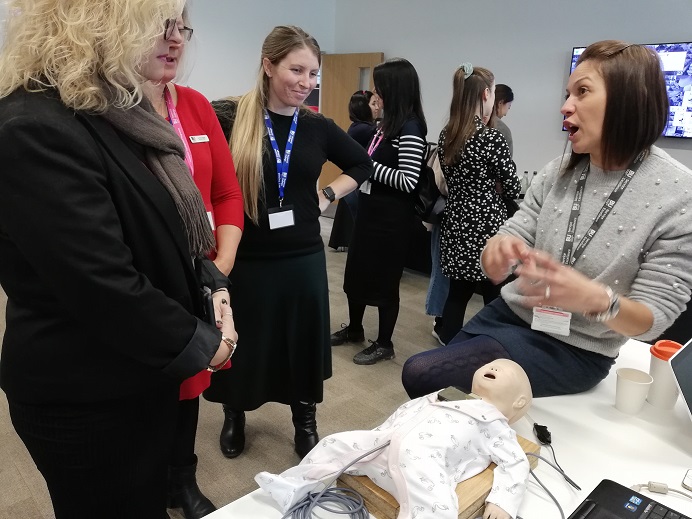
Denyse King offered visitors to her live research exhibition the opportunity to immerse themselves in demos of virtual reality learning environments being developed as part of her cross-faculty EdD.
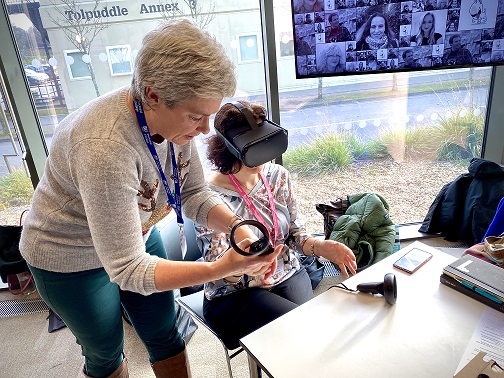
Helen Slater shared with delegates a visualisation and sound installation of forest biodiversity and wildlife she is monitoring as part of her PhD.

The event saw nearly 30 posters on display with PGRs presenting and discussing their research with peers and colleagues from across the university. The live research exhibition and poster presentation room had a wonderful energy all morning and we also had the pleasure of being visited by the Vice-Chancellor Professor John Vinney.

Create Lecture Theatre was the venue of choice for our oral presentation session this year. The variety of research being presented was fascinating and inspiring and the room was alight with discussion, there was a real buzz for all sessions. What really stood out was how PGRs engaged with the audience, getting us all involved, making us laugh and the discussions that followed demonstrated the engagement from the audience. I can confidently say that each presenter showed immense passion for their research which shone through in all presentation styles.
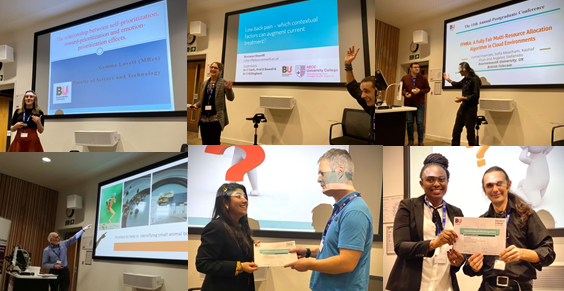
I would like to take this opportunity to also thank our fantastic session chairs Samreen Ashraf and Duncan Ki-Aries who made presenters feel comfortable and helped with the very smooth running of the four oral presentation sessions.
Following lunch, we were joined by Deputy Vice-Chancellor Professor Tim McIntyre-Bhatty who came along to introduce the conference keynote speaker Professor Genoveva Esteban. Genoveva shared with us her experience of engaging the public (of all ages) in her field of research, microbial ecology. Genoveva was passionate and motivating, highlighting the benefits of public engagement for research and the wide range of opportunities that PGRs could get involved in, while sharing some tricks of the trade.
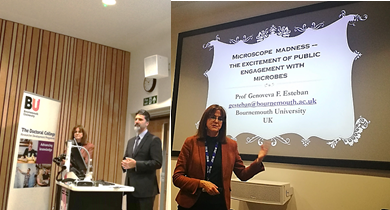
This interdisciplinary conference truly highlights the variety of research being undertaken by PGRs at BU, it is a fantastic opportunity for networking and enhancing postgraduate research community and culture.
Congratulations to all presenters, and thank you to all attendees and those that showed support in many other ways. If you would like to leave some feedback, the feedback form will be open until Sunday 15 December.
This year we made steps to improve the sustainability of the conference by reducing the brochure printing through making use of QR codes to access abstracts; encouraging delegates to bring their [Doctoral College] reusable bottles; provided free UniBus travel between campuses on the day of the conference and will re-display printed posters throughout the year to showcase PGR researcher wider.

If you have any questions, or would like to be involved in The 12th Annual Postgraduate Research Conference please get in touch.
On 3rd December 2019, Prof. Dinusha Mendis was an invited speaker at the International Copyright Law Conference 2019 held at the Millennium Hotel London. Labelled as the ‘ultimate guide to the operation of copyright’, this event brings together a range of international speakers from different sectors.
The 2019 edition focused on Copyright and AI, Brexit, legal tech and copyright, funding of copyright claims as well as legal case law and legal updates.
Prof. Dinusha Mendis from the Department of Humanities and Law at Bournemouth University, explored the copyright issues surrounding technologies such as 3D printing and 3D scanning and offered a number of insights from her recent research including insights from her recently published co-edited book, 3D Printing and Beyond: Intellectual Property and Regulation.
The event held over two days included speakers from practice, academia and policy.
A full list of speakers can be accessed here: https://law.knect365.com/international-copyright-law/speakers
The 2-day agenda can be accessed here: https://law.knect365.com/international-copyright-law/agenda/1
TODAY | FG06 | Drop-In | 09:30 – 11:00
Live Research Exhibition & Poster Presentations
All Welcome!
Check out our brochure to see what will be on display.
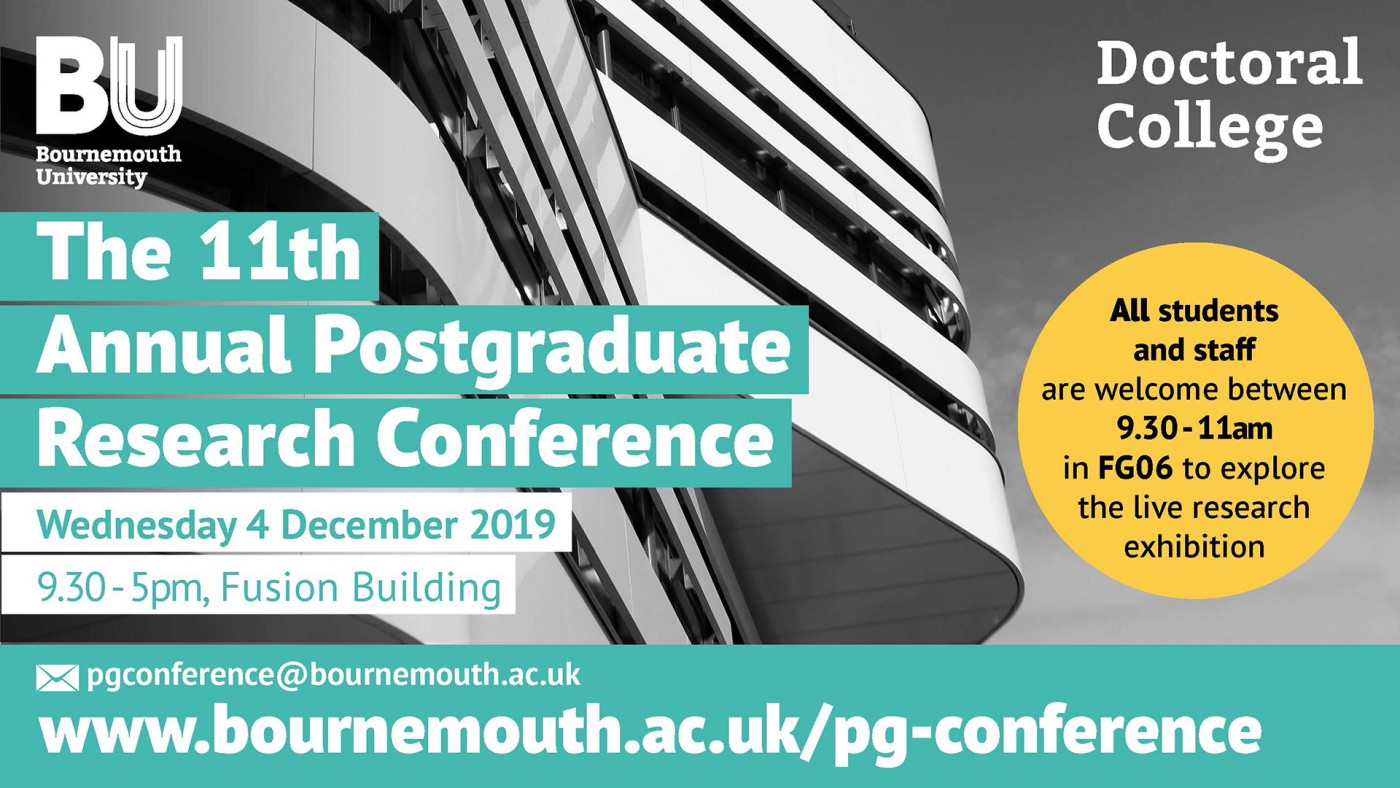
On 14th October 2019, Prof. Dinusha Mendis hosted the final workshop of the European Commission funded project, ‘The Intellectual Property Implications of the Development of Industrial 3D Printing’ in Brussels.
The project aims to formulate a clear picture of the Intellectual Property (IP) framework that could enhance the competitiveness of the Additive Manufacturing (AM) sector in Europe. As such, the workshop was attended by academics, practitioners, businesses and policy makers thereby bringing together key stakeholders in the field of 3D printing and IP laws.
The workshop commenced with a welcome from Amaryllis Verhoeven, Head of the Intellectual Property Unit at the European Commission. Thereafter, Dinusha Mendis (Project Lead) presented the main results, which was complemented by presentations from invited speakers and a panel discussion consisting of members of the project team and industry partners.
Ben Redwood (Hubs), Phil Reeves (Reeves Insight Ltd) and Phill Dickens (Added Scientific Ltd) considered the future of manufacturing and its different applications and uses for industry as well as consumers.
Thereafter, various issues from the Study were explored in a panel discussion. Panelists consisting of Lieven Claerhout / Bram Smits (Materialise NV), Ann Marie Shillito (Anarkik3D), and members of the project team (see below), considered IP issues in light of the views from industry, obtained as part of the Study. In bringing the workshop to its conclusion, Jean-Francois Romainville (IDEA Consult) spoke about next steps, in taking this project and other similar projects forward. Virginie Fossoul, (Legal and Policy Officer, European Commission), closed the workshop with some concluding remarks.
The presentations as well as the panel discussion can be accessed/watched here:
https://webcast.ec.europa.eu/workshop-on-3d-printing#
The project which was awarded to Bournemouth University in 2018, by the European Commission’s Directorate-General for Internal Market, Industry, Entrepreneurship and SMEs has been led by Prof. Dinusha Mendis (Principal Investigator) from the Department of Humanities and Law at Bournemouth University.
The Co-Investigators of this project include Dr. Julie Robson (Bournemouth University, UK), Dr. Rosa Ballardini (University of Lapland, Finland), Prof. Dr. Jan Nordemann (Boehmert & Boehmert, Germany), Prof. Phill Dickens (Added Scientific Ltd, UK), Dr. Maria del Carmen Calatrava-Moreno, Mr. Alfred Radauer (Technopolis Group, Austria) and Hans Brorsen (Germany).
The final project report is due for publication in early 2020.